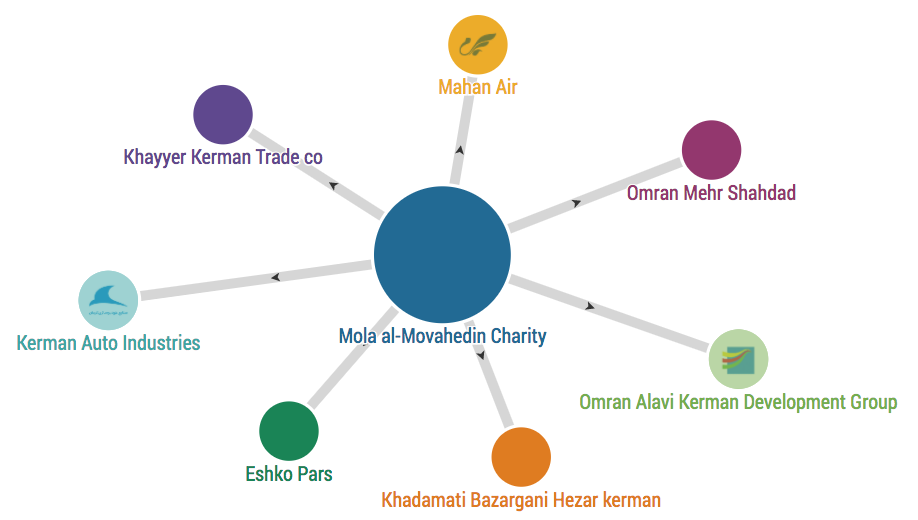Qasem Soleimani’s legacy lies not in his military prowess, but in the business empire he helped create
The death last year of Iran’s General Qasem Soleimani brought global attention to the Quds Force, the elite IRGC unit he headed. The force, long a thorn in the side of US policymakers, came under scrutiny for its influence over militant groups in Iraq and the Levant and its covert operations throughout the world. A martyr to some and a human rights violator to others, Soleimani’s controversial reputation overshadows the fact that, aside from being skilled in unconventional warfare and spycraft, he and his Quds Force comrades were sly businessmen. The fatal US attack on a Quds Force convoy in Baghdad in January 2020 may have eliminated the man, but the business empire Soleimani helped create lives on.
An airline, a bank, a car manufacturer, and dozens of engineering firms in Kerman Province are just some of the businesses that enable the Quds Force to finance its elaborate foreign missions. At the heart of this complex web is a charitable organization, or bonyad. Untaxed and unaccountable to the civilian government, this organization forms the ideal legal framework for the Quds Force’s secretive financial activities.
At the core of the Quds Force’s domestic business activities is Mola al-Movahedin Charity (MMC). MMC was created by Hossein Marashi using government subsidies. Marashi, a relative of the late former President Akbar Hashemi Rafsanjani, founded MMC when he was the governor of Kerman, Soleimani’s birth province, between 1985 and 1994.
The founders originally intended MMC to be an organization that brought together the most important officials in Kerman—the governor, the Friday prayer leader, and the IRGC commander—on its board of trustees. This political, religious, and paramilitary trio were to lead efforts to develop the province’s economy.1
In 2005, ahead of the presidential election that saw the victory of Mahmoud Ahmadinejad, the MMC charter was amended, removing the need for the involvement of local officials in the holding.2 It became a legacy organization guaranteeing lifetime positions for its trustees and their heirs.
This charter amendment did not mean that the organization, which once counted Soleimani among its trustees, parted ways with the IRGC. Currently, several trustees have IRGC service records. Other executives are either current or retired members of the IRGC or related to IRGC officials.

In practice, MMC became a financial vehicle for funneling state funds to Quds Force–owned businesses. Throughout the years, Marashi used his connection to the Islamic Republic ruling elite to enrich MMC. In one instance, while he was an MP (1996–2004) he attempted to strong-arm then finance minister Tahmasb Mazaheri to secure $150 million from the National Development Fund of Iran (NDFI) to purchase planes for Mahan Air. This airline, sanctioned by the US Treasury since 2011 “for providing financial, material and technological support to the IRGC-Quds Force,” is a pillar MMC subsidiary.
In another example of wrangling finances from the civilian government, the trustees of MMC and known Quds Force members created three interest-free loan funds (Qardh al-Hasan), which were later merged to create Resalat Bank.3 The group also created a political party in Kerman Province. Its members have secured political positions that they use to obtain profitable municipal contracts for their businesses.
Aside from Marashi and Soleimani, recent MMC trustees include former Kerman governor and Hassan Rouhani presidential campaign adviser Mohammad Ali Karimi, Mahan Air CEO Hamid Arabnejad Khanouki, and Kerman Governor Mohammad Javad Fadaei Fathabadi. In total, MMC has 12 trustees with large corporate networks reaching from major businesses like the National Iranian Copper Co. and Eghtesad Novin Bank to organizations like the Tehran Stock Exchange and the Khomeini Shrine bonyad.
Overview of MMC’s Main Businesses
- Mahan Air
- Omran Alavi Kerman Development Group
- Omran Mehr Shahdad
- Kerman Auto Industries
- Khadamat Bazargani Hezar Kerman
- Khayyer Kerman Trade Co.
- Eshko Pars
- Pars Esen
- Kerman Petrochemical Plant
- Kerman Development Organization
- Kerman-Bandar Abbas Freeway Construction, Operation and Maintenance Co.
- MMC was established in Kerman in 1987 with the aim of “catering to the needs of the oppressed and the impoverished.” Etelaat newspaper described MMC as a reformist-affiliated entity, equivalent to what the Astan Quds Razavi bonyad is for the conservatives.
- The trustees repealed Article 13, which stated that the governor and the Friday prayer leader of Kerman among others must be on the MMC board of trustees. Public business records show that 11 of Marashi’s friends were subsequently appointed trustees.
- The Tehran Stock Exchange website shows that two of Resalat Bank’s main shareholders are Pouyesh Salehin Investment Holding and the Haj Ali Akbar Sanaati Bonyad, which has MMC trustee and board member Ali Mostafavi among its board members. According to its financial records, the bank was created on February 15, 2012, and went on to consolidate the Resalat Salehin Tehran, Kerman, and Mazandaran Qardh al-Hasan funds.